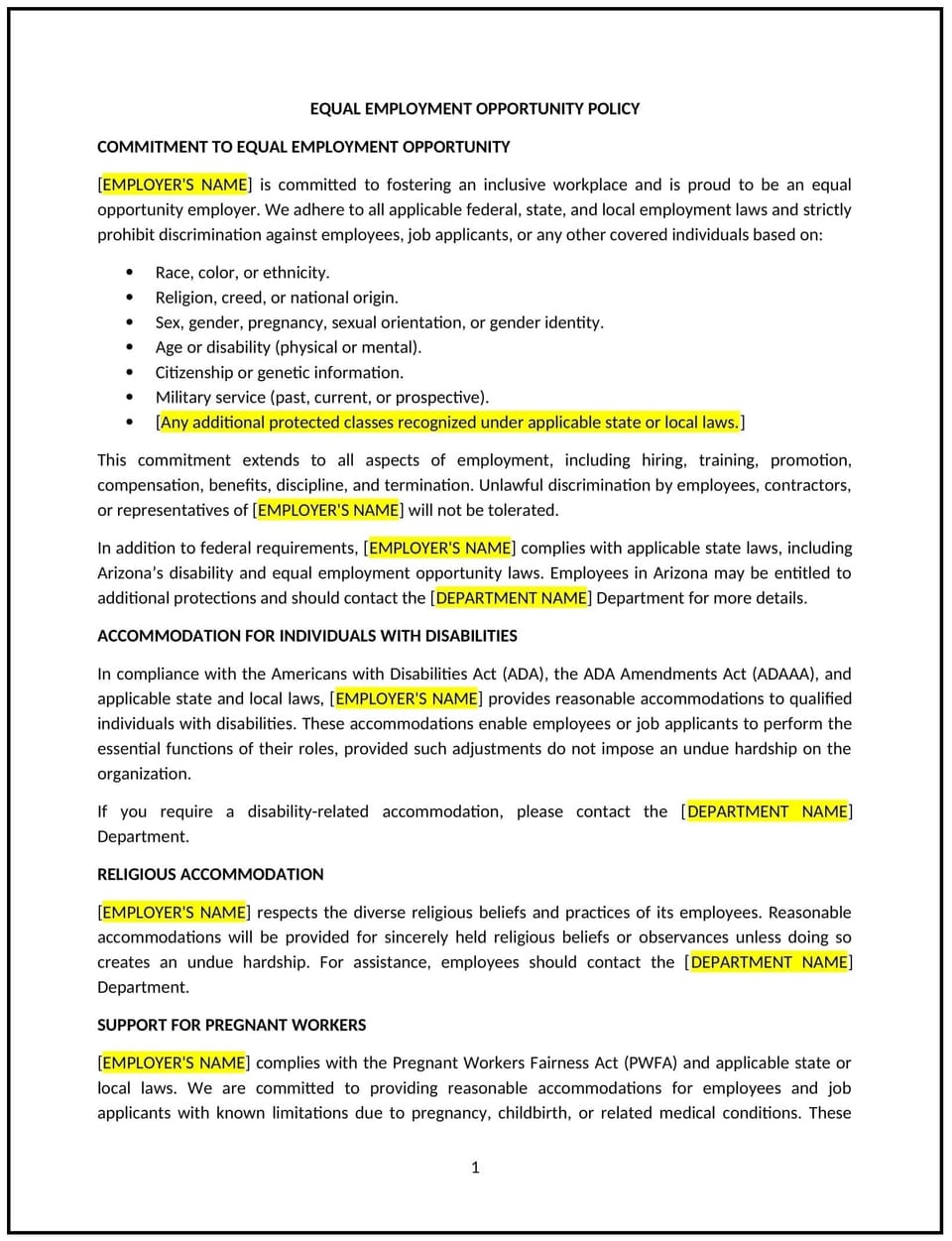Equal employment opportunity policy (Arizona)

Equal employment opportunity policy (Arizona)
In Arizona, an equal employment opportunity (EEO) policy demonstrates a business’s commitment to providing a workplace free from discrimination and harassment. This policy ensures that employment decisions are based on qualifications, skills, and performance, supporting compliance with federal and state laws, including the Arizona Civil Rights Act and Title VII of the Civil Rights Act.
This policy outlines the organization’s stance on equal opportunity, prohibited conduct, and procedures for addressing complaints. By implementing this policy, Arizona businesses can foster an inclusive workplace, reduce risks, and promote fairness.
How to use this equal employment opportunity policy (Arizona)
- Define equal opportunity: Clearly state the company’s commitment to making employment decisions without regard to protected characteristics such as race, gender, religion, age, disability, or national origin.
- Prohibit discrimination and harassment: Include examples of prohibited behaviors and affirm the company’s zero-tolerance stance.
- Provide complaint procedures: Outline how employees can report concerns about discrimination or harassment, including multiple reporting channels.
- Ensure confidentiality: Specify that all complaints will be handled discreetly and shared only with those directly involved in resolving the issue.
- Include anti-retaliation measures: Reassure employees that they are protected from retaliation when raising complaints in good faith.
Benefits of using an equal employment opportunity policy (Arizona)
This policy offers several advantages for Arizona businesses:
- Promotes inclusivity: Demonstrates the organization’s commitment to fostering a diverse and respectful workplace.
- Supports compliance: Aligns with Arizona and federal anti-discrimination laws, reducing the risk of legal disputes.
- Builds trust: Encourages employees to voice concerns, knowing they will be addressed fairly and professionally.
- Enhances reputation: Positions the business as an equitable employer, attracting top talent and fostering customer confidence.
- Reduces risks: Establishes clear guidelines to address and prevent discrimination or harassment proactively.
Tips for using an equal employment opportunity policy (Arizona)
- Address Arizona-specific considerations: Reflect the state’s unique demographic diversity and legal requirements, including protections under the Arizona Civil Rights Act.
- Train employees and managers: Provide regular training on EEO principles, anti-discrimination practices, and complaint handling.
- Monitor compliance: Periodically review hiring practices, promotions, and terminations to ensure fairness and alignment with the policy.
- Use inclusive language: Ensure all internal and external communications reflect the company’s commitment to equal opportunity.
- Review regularly: Update the policy to reflect changes in laws, workplace dynamics, or organizational goals.
Q: What characteristics are protected under this policy?
A: The policy prohibits discrimination based on race, gender, religion, national origin, disability, age, marital status, sexual orientation, and other protected characteristics under Arizona and federal law.
Q: How can employees report discrimination or harassment?
A: Employees can report concerns through designated channels such as HR, a direct supervisor, or an anonymous reporting system, as outlined in the policy.
Q: What steps does the company take after a complaint is filed?
A: The company will promptly investigate the complaint, maintain confidentiality, and take appropriate corrective actions if necessary.
Q: Does this policy apply to all levels of employees?
A: Yes, the policy applies to all employees, contractors, and third-party partners to ensure fairness across the organization.
Q: How does this policy support compliance with Arizona laws?
A: By aligning with the Arizona Civil Rights Act and federal regulations, the policy ensures legal and ethical employment practices.
This article contains general legal information and does not contain legal advice. Cobrief is not a law firm or a substitute for an attorney or law firm. The law is complex and changes often. For legal advice, please ask a lawyer.


